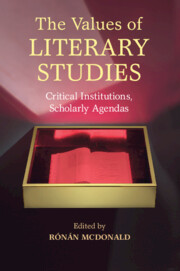Book contents
- Frontmatter
- Contents
- Notes on Contributors
- Acknowledgments
- Introduction
- 1 The Value of Criticism and the Project of Modernism
- 2 Caprice: Individual Subjectivity in Literary Criticism
- 3 The Phenomenology of Literary Valuation
- 4 Literature Is History: Aesthetic Time and the Ethics of Literary Will
- 5 Dead on Arrival: Time and the Value of Old Books
- 6 The Price of Value
- 7 To Shelter the Nothing That Happens
- 8 When Literary Criticism Mattered
- 9 Literature among the Objects of Modernist Criticism: Value, Medium, Genre
- 10 “Vale!” : Psychoanalysis, Value, and Literature
- 11 Afterlives of Comparison: Literature, Equivalence, Value
- 12 Feminism, Gender, and the Literary Commons
- 13 The Value of World Making in Global Literary Studies
- 14 Multiple Versions and Fictional Minds: Manuscript Research, Digital Editing, and Enactive Cognition in Literary Studies
- 15 After Suspicion: Surface, Method, Value
- 16 Literary Experience and the Value of Criticism
- Index
13 - The Value of World Making in Global Literary Studies
Published online by Cambridge University Press: 05 November 2015
- Frontmatter
- Contents
- Notes on Contributors
- Acknowledgments
- Introduction
- 1 The Value of Criticism and the Project of Modernism
- 2 Caprice: Individual Subjectivity in Literary Criticism
- 3 The Phenomenology of Literary Valuation
- 4 Literature Is History: Aesthetic Time and the Ethics of Literary Will
- 5 Dead on Arrival: Time and the Value of Old Books
- 6 The Price of Value
- 7 To Shelter the Nothing That Happens
- 8 When Literary Criticism Mattered
- 9 Literature among the Objects of Modernist Criticism: Value, Medium, Genre
- 10 “Vale!” : Psychoanalysis, Value, and Literature
- 11 Afterlives of Comparison: Literature, Equivalence, Value
- 12 Feminism, Gender, and the Literary Commons
- 13 The Value of World Making in Global Literary Studies
- 14 Multiple Versions and Fictional Minds: Manuscript Research, Digital Editing, and Enactive Cognition in Literary Studies
- 15 After Suspicion: Surface, Method, Value
- 16 Literary Experience and the Value of Criticism
- Index
Summary
“Our earth, the domain of weltliteratur is growing smaller and losing its diversity,” noted Eric Auerbach half a century ago. “Yet, weltliteratur does not merely refer to what is generically human or common.” Welt or world for Auerbach was emphatically not the standardized denominator of cultural diversity. But the idea of world literature, he averred in the era of the Cold War, was in danger of flattening the philological uniqueness of the world's many literatures into two distinct geocultural domains: the European American and the Russian Bolshevik. Auerbach's anxiety is ever more resonant in our age when five or six world languages – English, Mandarin, Arabic, Spanish, French, and Hindi – serve as translated homes for literatures from around the world. The distinction that Auerbach posits between the idea of “world,” on the one hand (one that resists philological flattening), and that of “world literature,” on the other (the potential site of geocultural standardization), has deep significance for this essay. What, I ask throughout, is the normative purchase of the term world in world literature as we contemplate the sheer scale of global literary transactions in the twenty-first century?
In order for us to contemplate the value of world making in global literary studies, it may help to begin with a foray into the meaning and resonance of the term world – both as a chronotope in literature and as a theoretical frame in the discipline of literary studies as it has evolved since the time Goethe first used the term weltliteratur to evoke a normative horizon opened up by the unprecedented traffic of literary works from around the globe in an era of enhanced commerce and imperial adventure. The first part of this essay undertakes this task. It excavates a poetics of the “world” in texts from three distinct cultural contexts, and then traces the shifting frontiers of value making in conceptions of world literature through the hundred-year arc of world history from 1850 to 1950 – also the era of the waxing and waning of European empires. The second part of the essay turns to our contemporary age when the charge of the term world in literary studies has been magnified to mirror the ubiquity of globalization as an economic and sociocultural matrix of maximal extension.
- Type
- Chapter
- Information
- The Values of Literary StudiesCritical Institutions, Scholarly Agendas, pp. 204 - 219Publisher: Cambridge University PressPrint publication year: 2015
- 2
- Cited by

